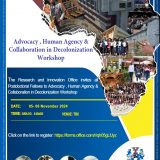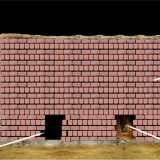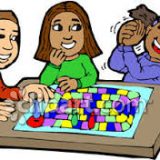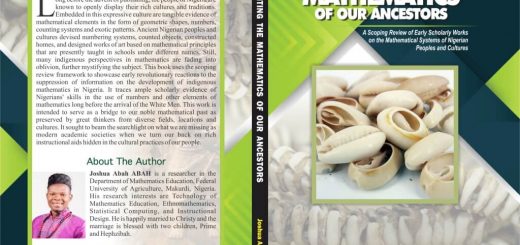Story Telling
![]()
Can Extinct School Folktales be awakened through Mathematics Storytelling in Nigerian Basic Education?
Narrator: Story? Story?
Pupils: Story!
Narrator: Once upon a time?
Pupils: Time! Time!
So goes the exciting routine before the commencement of every story within the “Story Period” in our local Basic School, a routine now remembered by only those who started formal education before the onset of the new millennium.Story-time used to be anticipated with all eagerness by all pupils, mainly because it is the last activity of the school day before dismissing for home. To many children, it is the ideal form of relaxation, freedom and play. What many of these children failed to notice at the time is the subtle role this storytelling time played in inculcating the right cultural values and enriching all forms of learning within the school setting. As adults, we are just beginning to appreciate the significance of story-time on the class timetable, more so now that it is no more. It is just dawning on us that our own children may not be so privileged to take turns preparing for story-time. They may not have the opportunity to relate a folktale learnt within the extended family circle to an expanded classroom audience where they could confidently make their voices heard. If not awaken in other forms, the loss of story-time will remain a great loss indeed, to Basic Education in Nigeria.
The type of stories narrated by teachers and pupils during story-time is meant to convey historical messages, encourage children to academic valour, and deter the cultivation of wrong attitudes and deviant behaviours. Often, the sequence and style are not of great concern in this type of storytelling as language, non-verbal communication and critical thinking. As such, though children may not be intrigued with the moral, cultural values in stories, they unconsciously assimilate these values by means of narration and role playing[1]. Stories take pupils on a journey that inspires them to learn about themselves and the world around them.
Basically, storytelling is retelling a tale to one or more listeners through voice and gestures[2]. It is not the same as reading a story to oneself or others aloud. It is different from reciting a piece from memory. Utley[2] adds that the storyteller creates a series of mental images associated with words, while the audience stares, smiles or leans forward to hear more. The narrative flows in a way that each listener can form unexpected connections and learn appropriately. Storytelling conveys folklore, a body of expressive culture within a particular population comprising the tradition of that culture, subculture or group. Folklore, in turn includes among other things, folktales, riddles, proverbs, myths, songs, legends and superstition[3]. Storytelling has been successfully deployed to interpret the universe, resolve natural and physical phenomena, teach morals, maintain cultural values, pass on methods of survival, and to praise God[2]. Professional storytellers believe in the power of story to heal the world and foster good retention[4]. In storytelling, there is a coming together, a removal of boundaries, and a total concentration and absorption of the spoken word[5].
Despite the amazing power of storytelling, present realities in Nigerian Basic Education constitute a grave challenge. The complexity and dynamism of the present Nigerian society bring about innovation in the production, transmission, retrieval and performance of culture[6]. Apart from the resulting worrisome levels of classroom inattentiveness[7] and plausible digital amnesia[8], the technological advancement is beginning to introduce a form of postmodern social codes, thereby relegating ordinary local activities, including storytelling, to the background. Folklore is disappearing fast with the incursion of modernity to the extent that many Nigerian youths have lost touch with their ethnic folklore and culture[3]. It is a good thing that the curriculum reacts to the demands of the time, but reactions that ended up in pushing out vital aspects of culturally relevant instructional technique must be eschewed. For instance, Abah[9] hinted that there is the indication that very little elements of history are being embedded in classroom instruction considering how General History as a subject has fared in the development of curriculum in Nigeria.
However, with more impressive impact being realized from researches into storytelling, there is the need to herald an awakening of this vital part of our tradition, particularly in mathematics education. The power of stories to convey mathematical concepts and ideas to children has long been recognised by educationists. Instead of blaming advances in science and technology for the cultural woes of this era, some mathematics educators and practitioners are discovering that stories are a great way to make science, technology, engineering and mathematics (STEM) educational ideas accessible and concrete to learners who might not think those kind of technical studies are for them[10;11]. By connecting a mathematical concept to young children through narratives, it is possible to truly engage their emotions, and to help them understand the power of the ideas being explored. This possibility has been empirically attested to by Albool[13], and many other researchers (e.g.[12]) who obtained research findings establishing that using storytelling strategy in teaching mathematics increased students’ ability to solve higher order problems.
With respect to successes observed via storytelling in mathematics, very little evidence from within Nigeria is available[14;9]. Specifically, outside the quasi-experimental setup (for instance, [15]; [16]), little is known about the regular or irregular use of stories by teachers in the mathematics classroom[17]. The level of awareness about the mathematical storytelling approach among Nigerian mathematics teachers at the Basic Education level are sparingly treated in available literature. If stories are being deployed as instructional strategies in Basic Mathematics, what are the various style of narration used? These and other pertinent concerns form the basis of a recent inquiry published in the International Journal on Emerging Mathematics Education (IJEME, 2(2), 165-178).
Findings
The findings from this simple survey indicate a high level of awareness of storytelling as an approach to teaching mathematics among Basic Mathematics teachers, although only a meager 37% are presently utilizing this time-proven augmentation to mathematics instruction delivery. Even among those making use of the approach, the patterns of stories are far from traditional folktales and oral traditions. Trickster stories using animal characters such as popular Tortoise’s stories, and tales of heroics from students’ local folklore can be innovatively crafted into classroom activities to augment the understanding of mathematical procedures and problem-solving strategies. The study unveils a high level of interest on the part of the teachers to make effective use of storytelling in their teaching practice. This particular expression of hope depends heavily on creating the necessary awareness on the relevance of stories to mathematics teaching. On this ground, the study recommends a concerted effort by all stakeholders within the Basic Education sector to mobilize for massive awareness campaign on the use of stories in teaching. Particular searchlight should be beam on the gradual erosion of community and cultural values occasioned by the fading away of traditional folktales. Such awareness campaign can make a case for the return of story-time to the Basic School timetable.
References
- Hourani, R. B. (2015). Folktales, children’s literature and national identity in the United Arab Emirates. The Looking Glass, 18(1). Retrieved on 17th March, 2017 from https://www.lib.latrobe.edu.au/ojs/index.php/tlg/article/view/598/557
- Utley, O. (2012). Keeping the tradition of African storytelling alive. Retrieved on 17th march, 2017 from http://teachers.yale.edu/curriculum/viewer/initiative_09.01.08_u
- Ezeigbo, A. T. (2013). The relevance of oral tradition: Folklore and the education of Nigerian youths. Contemporary Experiences: Journal of African Humanities, 1(1), 128. Retrieved on 17th March, 2017 from https://submission.scholasticahq.com/api/v1/attachments/340/download
- Baldasaro, M. M., Maldonado, N. & Baltes, B. (2014). Storytelling to teach cultural awareness: The right story at the right time. Learning Landscapes, 7(2), 219-232.
- Goral, M. B. & Gnadinger, C. M. (2006). Using storytelling to teach mathematics concepts. APMC, 11(1), 4-8.
- Sesan, A. A. (2014). Yoruba folktales, the new media and postmordernism. Khazar Journal of Humanities and Social Sciences, 17(2), 74-87.
- Agbo-Egwu, A. O., Abah, J. A. & Anyagh, P. I. (2017). Sustaining attention in a rapidly changing world: A survey of the status among mathematics education students in Nigeria. Benue Journal of Mathematics and Mathematics Education, 2(4), 13-21. A Publication of the Benue Chapter of the Mathematical Association of Nigeria. Retrieved on 30th June, 2018 from https://hal.archives-ouvertes.fr/hal-01562287/document
- Agbo-Egwu, A. O., Abah, J. A. & Anyagh, P. I. (2018). The influence of smartphone over-dependence on the recall of basic mathematics among mathematics education students in a Nigerian university. Science & Technology, 4, 97-105. A publication of The Discovery Scientific Society. Retrieved on 30th June, 2018 from http://www.discoveryjournals.org/sciencetech/Current_Issue/2018/A9.pdf
- Abah, J. A. (2016). Recency bias in the era of big data: The need to strengthen the status of history of mathematics in Nigerian schools. Advances in Multidisciplinary Research Journal, 2(4), 241-248. A Publication of the International Centre for Information Technology & Development, Southern University, Baton Rouge, LA, USA. Retrieved on 15th December, 2017 from http://media.wix.com/ugd/185b0a_9b1253273fea46768d1d96dcd03f4887.pdf
- Inan, C. (2015). A digital storytelling study project on mathematics course with preschool pre-service teachers. Educational Research Reviews, 10(10), 1476-1479.
- Schwartz, K. (2015). Could storytelling be the secret sauce to STEM education? Retrieved on 17th March, 2017 from https://ww2.kqed.org/mindshift/2015/06/05/could-storytelling-be-the-secret-sauce-to-stem-education/
- Abah, J. A. (2017). Viewing basic math through the lens of history: Undergraduates’ reflective learning in a history-augmented mathematics classroom. Waikato Journal of Education, 22(4), 33-48. doi:10.15663/wje.v22i4.557 . A publication of Wilf Malcolm Institute of Educational Research, The University of Waikato, New Zealand. Retrieved on 2nd March, 2018 from http://www.wje.org.nz/index.php/WJE/article/view/557
- Albool, R. (2013). The storytelling strategy in teaching mathematics may increase students’ abilities to solve high order questions and word problems. EDULEARN13 Proceedings, 2361-2367.
- Ogbu, S. U. (20180. Deconstructing the role of storytelling in the preservation of indigenous Nigerian traditions. Advances in Social Science Research Journal, 5(1), 148-156. DOI: 10.14738/assrj.51.4080
- Adetunji, A. A., Bamidele, E. F. & Awodele, B. A. (2013). Effects of historical simulations as narrative and graphic organizers on Nigerian junior secondary school students’ learning outcomes in basic science. Mediterranean Journal of Social Science, 4(2), 743-752. DOI: 10.5901/mjss.2013.v4n2p743
- Frederick-Jonah, T. M. & Akinsola, M. K. (2015). Enhancing pupils’ knowledge of mathematical concepts through game and poem. IOSR Journal of Research & Method in Education, 5(2), 60-66.
- Bature, I. J. (2014). Productive pedagogies for reforming secondary school mathematics classroom practice in Nigeria. Thesis presented for the Doctor of Philosophy of Curtin University. Pp 1- 377.
Views: 620
















